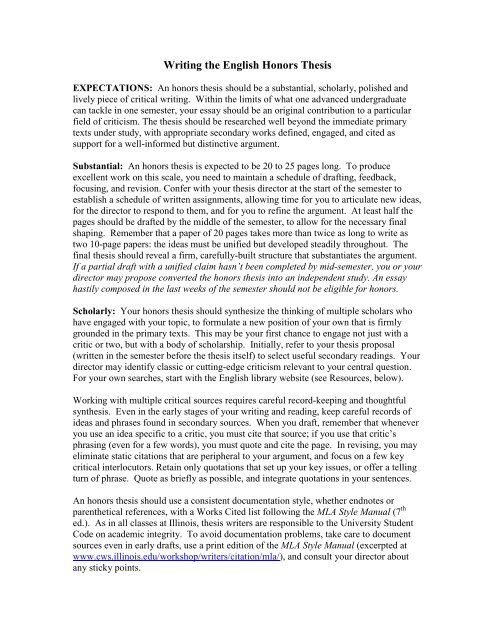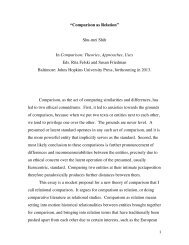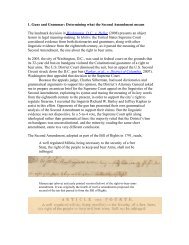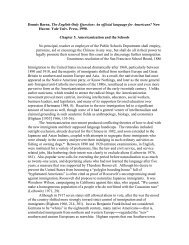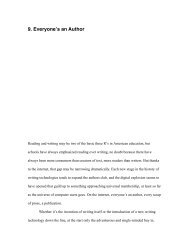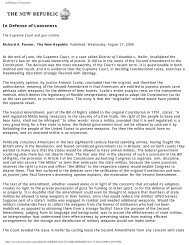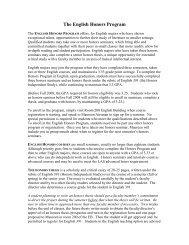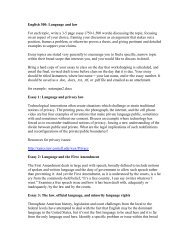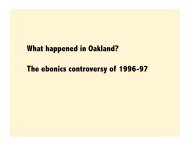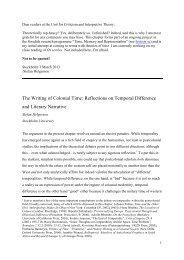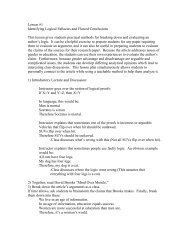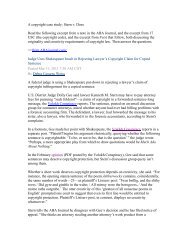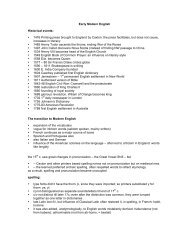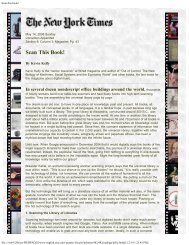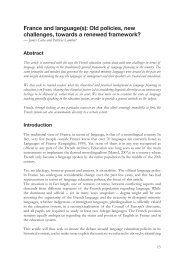Create successful ePaper yourself
Turn your PDF publications into a flip-book with our unique Google optimized e-Paper software.
<strong>Writing</strong> <strong>the</strong> <strong>English</strong> <strong>Honors</strong> <strong>Thesis</strong><br />
EXPECTATIONS: An honors <strong>the</strong>sis should be a substantial, scholarly, polished and<br />
lively piece of critical writing. Within <strong>the</strong> limits of what one advanced undergraduate<br />
can tackle in one semester, your essay should be an original contribution to a particular<br />
field of criticism. The <strong>the</strong>sis should be researched well beyond <strong>the</strong> immediate primary<br />
texts under study, with appropriate secondary works defined, engaged, and cited as<br />
support for a well-informed but distinctive argument.<br />
Substantial: An honors <strong>the</strong>sis is expected to be 20 to 25 pages long. To produce<br />
excellent work on this scale, you need to maintain a schedule of drafting, feedback,<br />
focusing, and revision. Confer with your <strong>the</strong>sis director at <strong>the</strong> start of <strong>the</strong> semester to<br />
establish a schedule of written assignments, allowing time for you to articulate new ideas,<br />
for <strong>the</strong> director to respond to <strong>the</strong>m, and for you to refine <strong>the</strong> argument. At least half <strong>the</strong><br />
pages should be drafted by <strong>the</strong> middle of <strong>the</strong> semester, to allow for <strong>the</strong> necessary final<br />
shaping. Remember that a paper of 20 pages takes more than twice as long to write as<br />
two 10-page papers: <strong>the</strong> ideas must be unified but developed steadily throughout. The<br />
final <strong>the</strong>sis should reveal a firm, carefully-built structure that substantiates <strong>the</strong> argument.<br />
If a partial draft with a unified claim hasn’t been completed by mid-semester, you or your<br />
director may propose converted <strong>the</strong> honors <strong>the</strong>sis into an independent study. An essay<br />
hastily composed in <strong>the</strong> last weeks of <strong>the</strong> semester should not be eligible for honors.<br />
Scholarly: Your honors <strong>the</strong>sis should syn<strong>the</strong>size <strong>the</strong> thinking of multiple scholars who<br />
have engaged with your topic, to formulate a new position of your own that is firmly<br />
grounded in <strong>the</strong> primary texts. This may be your first chance to engage not just with a<br />
critic or two, but with a body of scholarship. Initially, refer to your <strong>the</strong>sis proposal<br />
(written in <strong>the</strong> semester before <strong>the</strong> <strong>the</strong>sis itself) to select useful secondary readings. Your<br />
director may identify classic or cutting-edge criticism relevant to your central question.<br />
For your own searches, start with <strong>the</strong> <strong>English</strong> library website (see Resources, below).<br />
Working with multiple critical sources requires careful record-keeping and thoughtful<br />
syn<strong>the</strong>sis. Even in <strong>the</strong> early stages of your writing and reading, keep careful records of<br />
ideas and phrases found in secondary sources. When you draft, remember that whenever<br />
you use an idea specific to a critic, you must cite that source; if you use that critic’s<br />
phrasing (even for a few words), you must quote and cite <strong>the</strong> page. In revising, you may<br />
eliminate static citations that are peripheral to your argument, and focus on a few key<br />
critical interlocutors. Retain only quotations that set up your key issues, or offer a telling<br />
turn of phrase. Quote as briefly as possible, and integrate quotations in your sentences.<br />
An honors <strong>the</strong>sis should use a consistent documentation style, whe<strong>the</strong>r endnotes or<br />
paren<strong>the</strong>tical references, with a Works Cited list following <strong>the</strong> MLA Style Manual (7 th<br />
ed.). As in all classes at Illinois, <strong>the</strong>sis writers are responsible to <strong>the</strong> University Student<br />
Code on academic integrity. To avoid documentation problems, take care to document<br />
sources even in early drafts, use a print edition of <strong>the</strong> MLA Style Manual (excerpted at<br />
www.cws.illinois.edu/workshop/writers/citation/mla/), and consult your director about<br />
any sticky points.
Polished: An honors <strong>the</strong>sis is expected to be carefully proofread by <strong>the</strong> student before<br />
final submission. While spell-checking software can help, it will not catch all errors.<br />
<strong>Honors</strong> students should know to check <strong>the</strong>ir own weaknesses in structure or punctuation.<br />
Lively: An honors <strong>the</strong>sis is expected to develop its argument, not just to repeat it with a<br />
mechanical accumulation of evidence. Early completion of a draft will allow you and<br />
your director to find ways to enliven <strong>the</strong> <strong>the</strong>sis with a strong opening, and to build its<br />
momentum through your various sub-points to a thoughtful conclusion.<br />
RESOURCES<br />
The Literatures and Languages Library website (www.library.illinois.edu/llx) links to<br />
carefully selected online resources for literature and film. The <strong>English</strong> librarian, Harriett<br />
Green (green19@illinois.edu), is especially interested in assisting honors <strong>the</strong>sis writers.<br />
The Writer’s Workshop (www.cws.illinois.edu/workshop/) assists any university writer<br />
facing new writing challenges. Consultations can focus on concerns you specify.<br />
TIMELINE<br />
The first two weeks of <strong>the</strong> semester: Consult with your director and define a schedule<br />
of reading and writing. Wanting to keep it isn't enough; plan how to keep it. Ask your<br />
director to read and discuss short, informal writings as you focus on a working <strong>the</strong>sis.<br />
Mid-semester: Submit at least half of your project to your director by this point in <strong>the</strong><br />
semester, if not before. You could set a definite date to submit 10 pages, or two dates for<br />
5-page increments. You’ll revise and expand this draft in <strong>the</strong> rest of <strong>the</strong> term.<br />
November for Fall, March for Spring: Select two appropriate faculty members as<br />
readers for your <strong>the</strong>sis, consulting with your director. Also check <strong>the</strong> <strong>English</strong> department<br />
website list of “Faculty by Areas of Specialty.” Email faculty members or visit <strong>the</strong>ir<br />
office hours, briefly describing your project and asking if <strong>the</strong>y are willing to serve as<br />
readers. Readers are ordinarily faculty members in <strong>the</strong> <strong>English</strong> Department, but when<br />
appropriate, one reader may be a faculty member from ano<strong>the</strong>r department.<br />
Due date: <strong>Honors</strong> <strong>the</strong>ses are due no later than one week before <strong>the</strong> last day of classes:<br />
in Spring 2013, Wednesday, April 24 th . Submit 4 hard copies: one to <strong>the</strong> director, one to<br />
each reader, and one to Angela Smith, to be filed in 200 EB. Please list director and<br />
readers on <strong>the</strong> title page. Report covers are not necessary; large clips will suffice.<br />
Evaluation: The director and <strong>the</strong> two readers each write letters of evaluation to <strong>the</strong><br />
<strong>English</strong> <strong>Honors</strong> Committee. On Reading Day, this Committee reviews <strong>the</strong> letters,<br />
examines <strong>the</strong> student’s overall record, and determines which students receive honors and<br />
at which level. Students are <strong>the</strong>n informed by mail of <strong>the</strong> results and, after <strong>the</strong> semester<br />
is over, sent copies of <strong>the</strong> letters of evaluation. A course grade in <strong>English</strong> 391 also is<br />
determined by <strong>the</strong> <strong>the</strong>sis director.<br />
Rev. 3/6/2013


